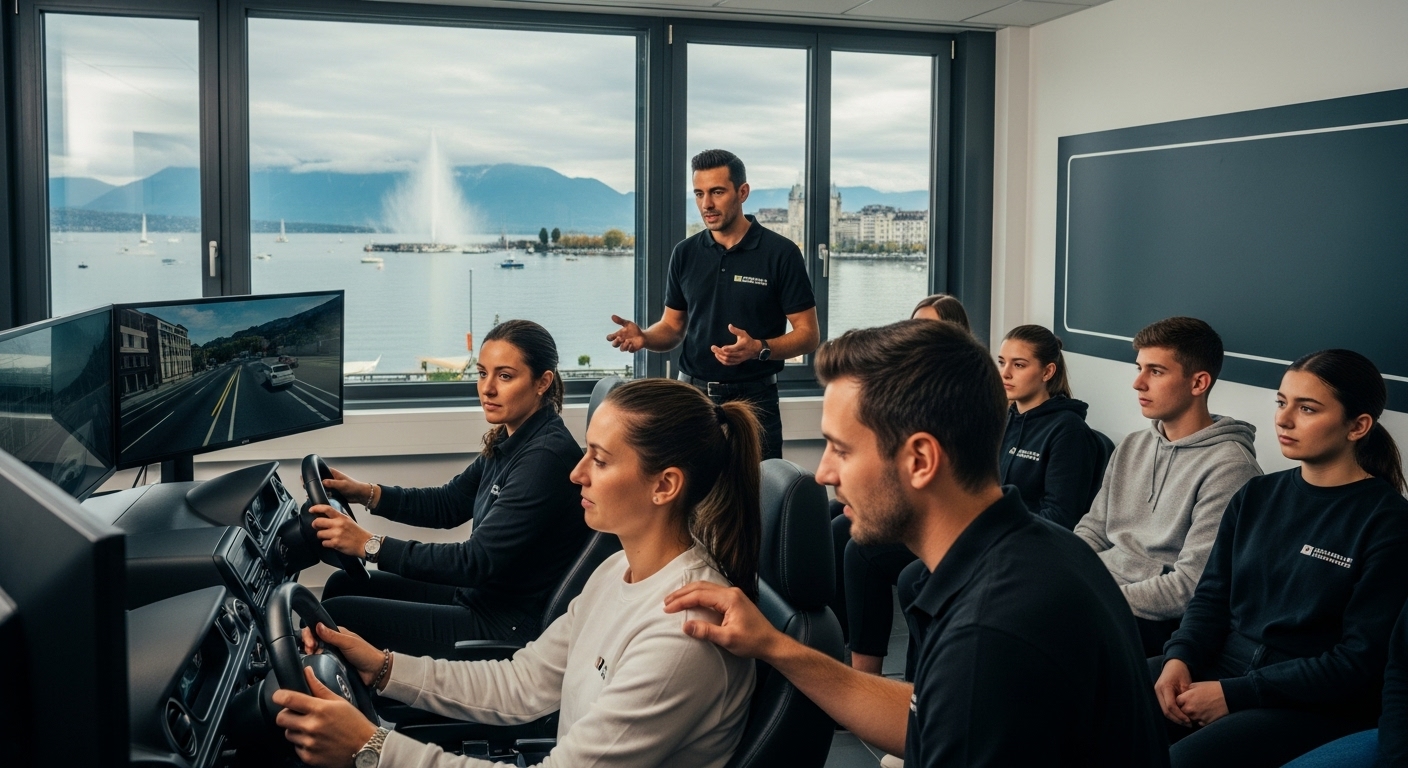Every year, obtaining a driving license in Geneva attracts hundreds of new applicants, all motivated by the independence of driving. Yet, despite a growing desire, over 30% of applicants fail their first practical test. And paradoxically, it’s not the final test that causes them the most problems, but all the upstream preparation that makes the real difference.
Table of contents
- Understanding driver’s license requirements
- Registering with a driving school in Geneva
- Learn the highway code using manuals
- Take practical driving lessons
- Take an assessment test before the final exam
- Preparing for the day of the driving test
- Obtaining and using your driver’s license
Quick summary
| Awareness | Explanation |
|---|---|
| Understanding the prerequisites | You must be 18 years old, have a medical certificate and be legally resident in Switzerland. |
| Choosing the right driving school | Evaluate the quality of instructors, rates and timetables for the best training. |
| Use up-to-date manuals | Choose up-to-date teaching resources to help you master the Highway Code. |
| Practice with driving lessons | Prepare yourself with enough lessons to gain confidence and skills. |
| Take an assessment test | Before the exam, test your skills to identify your weaknesses and improve. |
1: Understanding driver’s license requirements
Obtaining a driver’s license in Geneva requires rigorous preparation and a clear understanding of the regulatory requirements. To succeed on the road to obtaining your license, it’s essential to know exactly what the administrative and technical requirements are.
The first step is to identify the essential prerequisites. According to the City of Geneva, applicants must meet several fundamental criteria:
- Must be at least 18 years old
- A medical certificate attesting to driving ability
- Be a legal resident of Switzerland
In addition to these basic requirements, there are a number of special features specific to Geneva’s regulations. You’ll need to follow a structured training program that includes compulsory theoretical and practical courses. Discover our complete training courses for future drivers, which will guide you through each step.
Theoretical preparation involves learning the Highway Code, understanding road signs and acquiring essential road safety knowledge. This phase is crucial to passing the theory test, which is your first big step.

Applicants are advised to familiarize themselves with Geneva’s specific traffic rules, which may differ slightly from other Swiss regions. This includes knowledge of urban zones, speed limits and priority rules.
Last but not least: plan a suitable budget for your training, including registration fees, theory courses, driving lessons and exams. Preparation is an investment in your future mobility.
2: Enrolling in a driving school in Geneva
Choosing the right driving school is a crucial step on the road to obtaining your driving license in Geneva. This decision will directly influence your learning experience and your chances of success.
To make the right choice, it’s crucial to evaluate several essential criteria:
- The quality and experience of our instructors
- Prices and course options
- Flexible training hours
Registering with a driving school requires careful preparation. Discover our tips for selecting the best driving school to help you make the best decision.
In Geneva, driving schools must meet strict quality standards. Check their official accreditation and exam pass rates. A good indicator is the percentage of candidates who obtained their license in previous sessions.
At your first meeting with the driving school, prepare a set of specific questions. Ask for information on the training program, the number of theory and practical lessons included, and how to take the exams.
There are usually several options to choose from: traditional face-to-face courses, accelerated courses and complementary online training. Choose the one that best suits your learning pace and availability.
Don’t forget to check the training equipment. A modern driving school has recent, well-maintained vehicles and driving simulators for optimum preparation.
One final recommendation: compare several driving schools before enrolling. Each school has its own teaching methods and specific features. Take your time to find the one that suits you best.
3: Learn the highway code with the help of manuals
Learning the Highway Code is a fundamental step in obtaining your driving license in Geneva. This theoretical phase will enable you to understand the essential rules of traffic and road safety.
To succeed at this stage, it’s crucial to have the right teaching resources at your disposal. Discover our comprehensive guides to the Swiss Highway Code to help you prepare.
Recommended code manuals generally cover several crucial areas:
- Road signs and how to understand them
- Priority and traffic rules
- How to behave in a driving situation
To maximize your learning, develop a structured working method. Start by reading each chapter carefully, taking notes and highlighting important information. Repetition and in-depth understanding are your best allies.
Some manuals include practice exercises and mock tests that simulate real exam conditions. Use these resources to regularly assess your level of knowledge and identify your weak points.
There’s more to learning the Highway Code than memorizing the rules. It’s about understanding the principles of safety and responsibility that underlie each rule. Take the time to analyze the meaning of each rule, rather than learning them mechanically.
Don’t forget that regulations change regularly. Make sure you always use up-to-date manuals and resources that reflect the latest changes in road traffic legislation.
Ask your driving school for advice on the best preparation media to use. Some offer complementary digital resources, adapted to modern learning methods.
4: Take practical driving lessons
Practical driving lessons are the heart of your training, transforming your theoretical knowledge into concrete skills on the road. This stage is crucial to developing your confidence and safety as a future driver.
Discover the essential basics for a good start to driving that will help you understand the fundamentals of driving.
The main objectives of the practical lessons include:
- Mastering vehicle controls
- Develop an acute perception of the road environment
- Understanding complex driving situations
During these sessions, your driving instructor will play an essential role. He or she will guide you progressively, analyzing your strengths and areas for improvement. Each lesson is designed to help you progress methodically.
In Geneva, traffic conditions can be particularly demanding. The lessons will prepare you for the specificities of the city: managing complex junctions, interacting with public transport, and driving in high-density traffic areas.
Plan for a sufficient number of lessons to acquire real fluency. On average, candidates require between 20 and 30 hours of practical training before taking the exam. This figure may vary according to your experience and learning capacity.
The lessons will cover different types of situations: city driving, freeway driving, night driving, rainy weather. This variety will enable you to develop the technical versatility essential for your future autonomy as a driver.
Don’t hesitate to ask your instructor questions, express doubts and ask for detailed explanations. Open and constructive communication is the key to effective learning.
5: Take an assessment test before the final exam
Before you take the final exam, an assessment test is a strategic step to measure your level of preparation and identify areas requiring further work. This crucial phase will enable you to maximize your chances of success.
Our comprehensive guide to driving test preparation will help you tackle this step with confidence.
The main aspects assessed in this mock test include :
- Technical control of the vehicle
- Understanding traffic rules
- The ability to react to unexpected situations
The main objective is to simulate real test conditions. Your instructor will reconstitute a course close to the one you will encounter on D-day, analyzing your performance with meticulous attention.
During this test, several specific skills will be evaluated: your ability to maneuver, your perception of hazards, your compliance with speed limits, and your interaction with other road users.
Be prepared to receive detailed and constructive feedback. Instructors will identify your strengths and areas for improvement. Every mistake is a learning opportunity, not a failure.
To optimize your preparation, practice regularly the exercises that have been identified as difficult. Repetition and concentration are your best allies in overcoming your weaknesses.
Remember, this mock test is not a final exam, but a teaching tool. It offers you a unique opportunity to improve before the final test, in complete serenity and without the pressure of D-day.
A final word of advice: stay calm, concentrate and listen to your instructor’s recommendations. Your attitude during this mock test will be an excellent indicator of your overall preparation.
6: Preparing for the day of the driving test
The day of the driving test represents the high point of your preparation. A calm, methodical approach is your best guarantee of success at this decisive stage.
Discover our tips on how to pass your driving test with confidence.
Here are the essential elements to prepare before the big day:
- Your original administrative documents
- Your valid identity card or passport
- Your exam registration confirmation
Mental preparation is just as important as physical preparation. Get enough sleep the night before the test and avoid unnecessary stress. A calm, focused attitude will enable you to demonstrate your true driving skills.
Remember to check some practical details the day before: the condition of your vehicle, seat and mirror settings, and make sure all the necessary documents are in order.
On the big day, arrive early at the meeting place. This extra time will allow you to relax, breathe deeply and get into the right mental frame of mind.
During the test, concentrate on what you’ve learned. Remember that the expert is not looking for absolute perfection, but for safe, responsible and controlled driving. Remain attentive to instructions, keep calm and use common sense.
Remember, every decision counts. Scrupulously respect the highway code, be aware of your surroundings and anticipate potential situations.
Even if you make a mistake, don’t be discouraged. Most experts appreciate a candidate who can recover quickly and keep his or her cool.
One final word of advice: be confident in your training and skills. You’ve worked hard to get where you are, and that confidence will be your greatest asset on exam day.
7: Getting and using your driver’s license
Once you’ve passed your test, obtaining your driving license marks the start of a new and important stage in your life as a driver. This phase involves a number of essential administrative steps and responsibilities.
Consult the important information from the Office Cantonal des Véhicules to understand all the administrative procedures.
Here are the main steps to follow once you have obtained your licence:
- Get your official driver’s license back
- Verify the accuracy of personal information
- Understanding the limitations associated with your new status as a young driver
Geneva’s probationary driver’s license comes with specific conditions. During the first three years, you’ll be expected to take extra care and responsibility on the road. A points system will be set up to evaluate your driving behavior.
Your new license comes with a number of legal obligations. Always keep your original documents, keep your address up to date and make sure you renew your license on time.
Continuing education is recommended. Some complementary courses will enable you to improve your skills and potentially reduce the restrictions on your probationary license.
Make sure you maintain the right insurance coverage. Your new driving situation requires comprehensive protection that covers potential risks.
Don’t forget that your license can be temporarily suspended for serious offences. Respect the Highway Code scrupulously and drive responsibly and courteously.
A final word of advice: think of your license as a privilege, not just a right. Every journey is an opportunity to demonstrate your maturity and commitment to road safety.
This summary table presents the 7 major steps involved in obtaining a driver’s license in Geneva, summarizing the prerequisites, practical steps and key tips discussed in the article.
| Step | Main objective | Key points / Tips |
|---|---|---|
| Understand the requirements | Make sure you meet all legal requirements | 18 years, medical certificate, residence in Switzerland, knowledge of local code |
| Driving school registration | Choose the right school for your needs | Evaluate instructors, formulas, success rates, equipment, compare offers |
| Studying the Highway Code | Master the essential theory | Use up-to-date manuals, practical exercises, support understanding |
| Practical driving lessons | Gain confidence and competence on the road | 20 to 30 hours, experienced instructor, adapt to traffic conditions |
| Pre-exam assessment test | Measure your level and target areas for improvement | Real exam simulation, detailed feedback, correct weaknesses |
| Preparing for exam day | Approach the exam with confidence | Mental preparation, ready documents, punctuality, staying confident |
| Getting and using your licence | Start your life as an official driver | Probationary license conditions, legal obligations, suitable insurance |
Ready to turn your apprenticeship into a success in Geneva?
You’ve completed the 7 steps to obtaining your driving license in Geneva: administrative requirements, highway code, practical lessons and a mock test. However, the stress of success and the need for reassuring support persist. With Auto-École Lémanique, you have access to comprehensive training, personalized follow-up and the advice of experienced instructors to overcome your doubts today. Find out how our team can best prepare you, help you master each step and set you apart at the final exam.
Experience human and transparent support every step of the way with our renowned recognized driving school in Geneva. Take a look at our practical tips for passing your practical exam and book your next course with ease. Take the first decisive step towards success by visiting https://ae-l.ch from now on. Your future on the road starts here.
Frequently asked questions
What are the requirements for obtaining a driver’s license in Geneva?
To obtain a driver’s license in Geneva, you must be at least 18 years old, have a medical certificate attesting to your fitness to drive, and be a legal resident of Switzerland.
What is the average length of practical training for a driver’s license?
On average, candidates require between 20 and 30 hours of practical driving lessons before taking the test. This figure may vary according to each individual’s driving experience and learning ability.
What do I need to prepare on the day of my driving test?
On the day of the exam, make sure you bring your original administrative documents, your valid identity card or passport, and your exam registration confirmation. Mental preparation is also essential, so stay calm and relaxed.
How is the pre-test conducted?
The assessment test simulates real test conditions. Your instructor will analyze your skills in terms of technical mastery of the vehicle and understanding of traffic rules, and give you detailed feedback on your strengths and areas for improvement.
Recommendation
- How do I obtain a Geneva driver’s license, step by step? – AEL – Auto-école Lémanique (Geneva)
- Strategy for obtaining a permit in Geneva – AEL
- How to pass a Geneva car test – AEL – Auto-école Lémanique (Geneva)
- 1. Changing your driver’s license in Switzerland – AEL
- 10 Perfect Geneva Photo Spots for Filmmakers and Creatives
- Safe & Smooth Rides with ALPY Alpine Private Transfers





